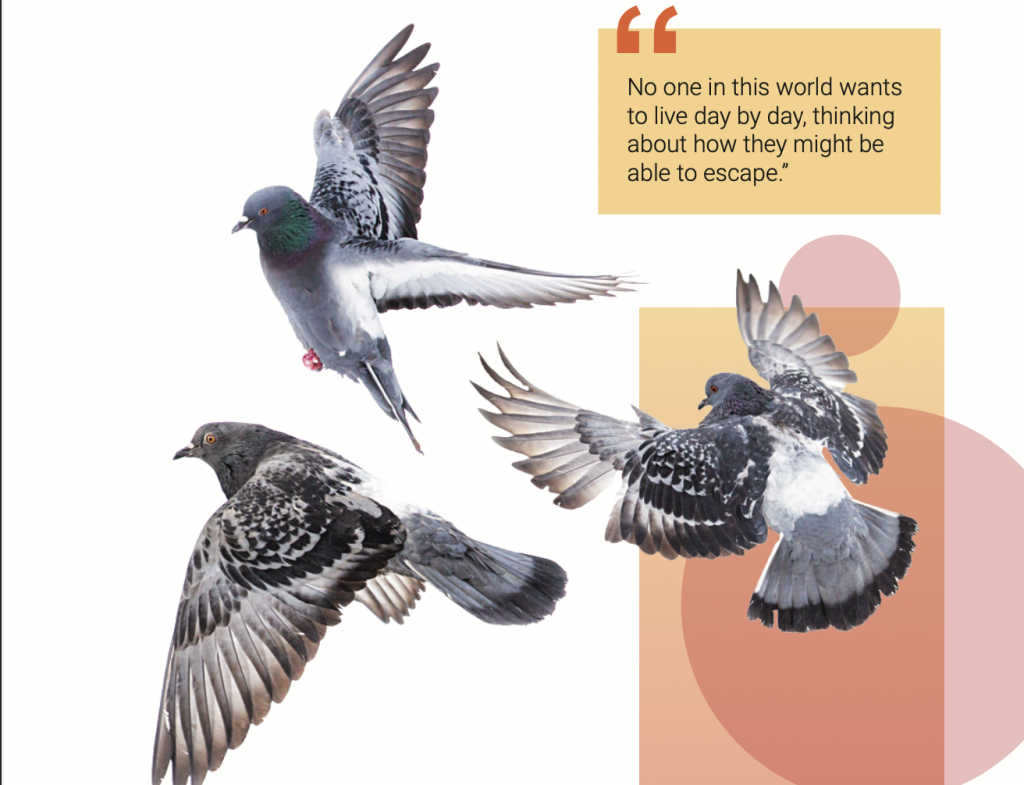We’ve all heard about pandemic Puppies and pandemic Kittens, providing us with companionship and comfort in such isolating times. Other people, however, might be more comfortable with feathered rather than furry friends.
But for species known for having the freedom to fly, one has to wonder whether the pandemic has had any effect on them – positive or otherwise.
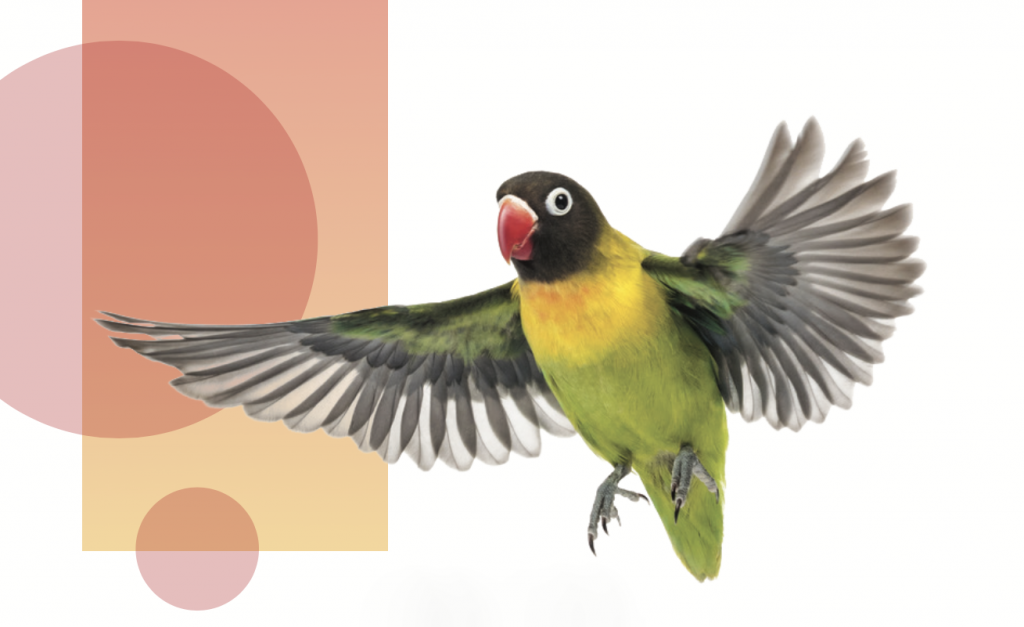
ADJUSTING TO LIFE WITH A FEATHERED BABY
Reese V. Corpuz, a public servant and a mom to her bird Peaky Minaj, adopted Peaky when her neighbor had too much on her plate. Though Reese took care of several love birds as a child, meeting Peaky in August 2021 meant it would be the first time she would be caring for a Bird during the pandemic.
On weekdays, Reese has to report to her office, which means Peaky is left in her cage at home. Every day, Peaky’s mom ensures that she has enough food and water before she leaves, and when she returns, there’s always time to play. The two sing to each other and bond over treats as Reese allows Peaky to fly around her room to stretch her wings.
Weekends are different; Peaky gets to fly around Reese’s room all day and take baths.

Compared to Cats and Dogs, Reese says, “I find that birds have limited ways to show you how they feel.” Their body language, from the way they blink to how they flap their wings, can convey their affection for their human companions.
While Reese says that caring for a bird is relatively low-maintenance and not so costly, the time she spends away from Peaky while at her office has been difficult. This is why when she gets home, she makes sure to be physically present with Peaky.
WORKING FROM HOME: HAPPIER BIRDS
Unlike Reese, Poi Medina, an art teacher and Birdkeeper, has been able to work from home during the pandemic. Because of this, he says he’s had plenty of time to watch his birds and bond with them, and he now has more time to “give them what they need,” especially in terms of their diet.
Poi says, “I also have more time to clean and disinfect their space and more time to play with them compared to when I’m always away for work.”
The extra time he’s been spending at home led him to notice that his birds, an English Budgerigar named Vrinda and a Rainbow Budgerigar named Bahaghari, have become “healthier and happier,” having now become so attached to Poi.
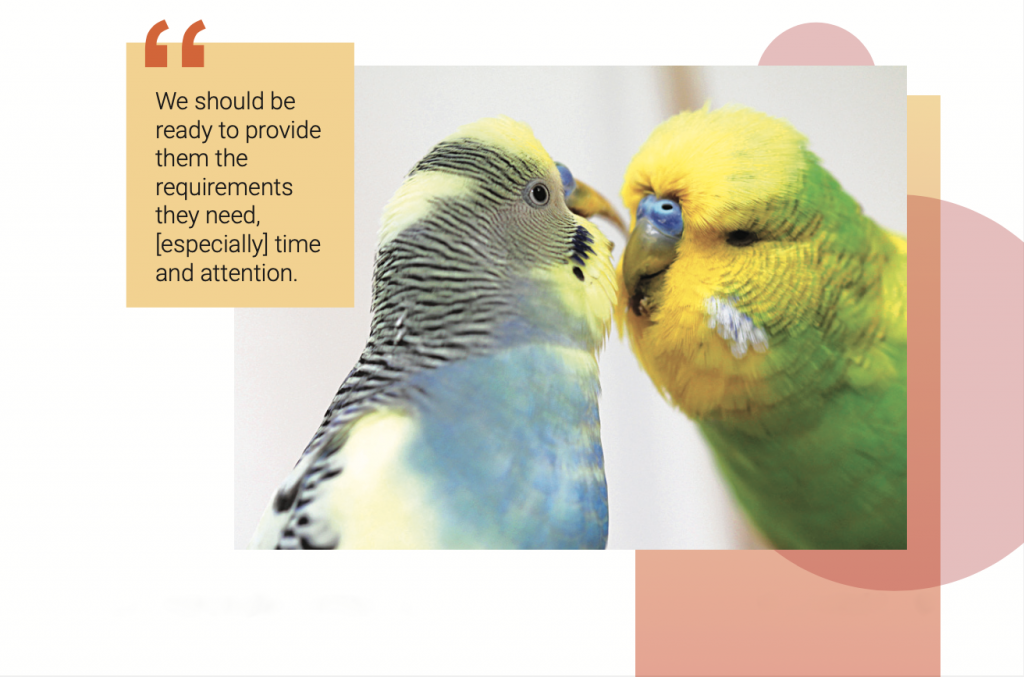
Vrinda and Bahaghari have been with Poi for almost a year and a half. He adopted them from his cousin and friend, and though Vrinda and Bahaghari are the first birds he’s taken care of, Poi describes the experience as a dream come true.
Despite the love he feels for his birds and the stress relief he gets from caring for them, Poi warns potential bird carers to remember that caring for animal companions like birds “is a lifetime commitment.” He says, “We should be ready to provide them the requirements they need, [especially] time and attention.”
One way he ensures his birds get what they need is by sometimes allowing them outside of their house or enclosure, letting them fly freely as long as there aren’t any predators like Cats nearby. Of course, this should be done with supervision and in a bird-friendly space.
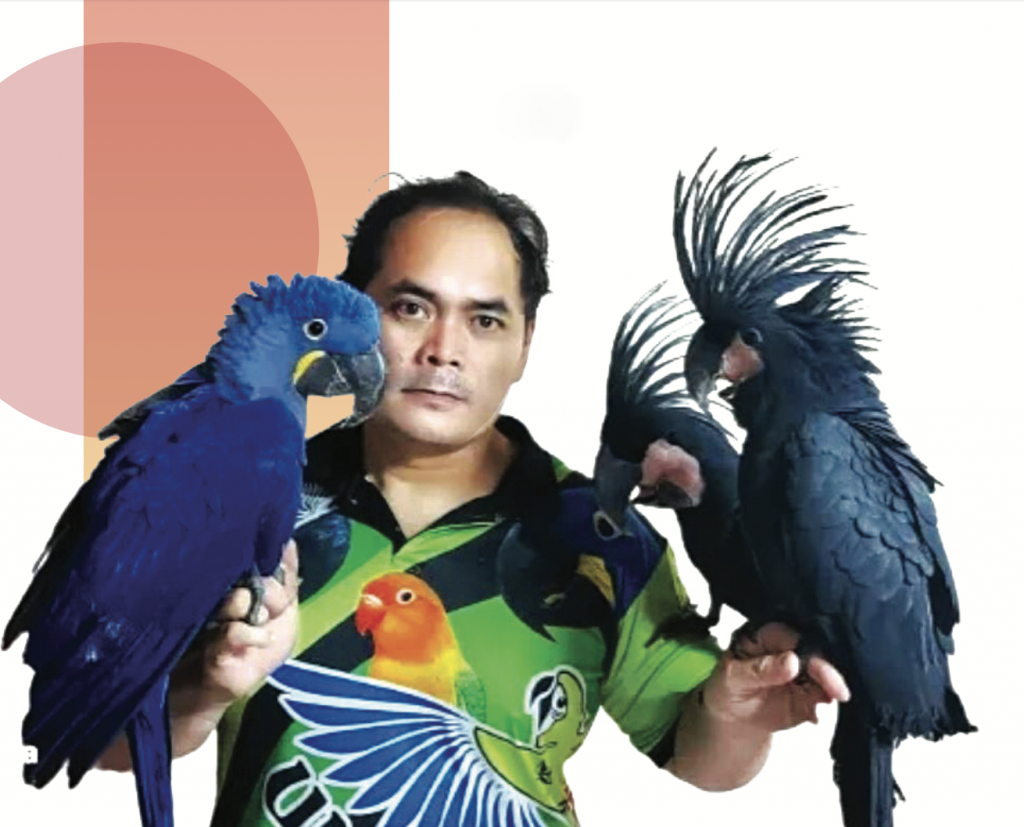
Florante Gozon is the president and founder of the United Flyers Philippines (UFP) group.
FREE FLIGHT: SLIGHT FREEDOM
Florante S. Gozon, the president and founder of the United Flyers Philippines (UFP) group, sees something special in letting birds fly freely in what’s termed as “free flight.” He says, “Birds are fun to be with because they can talk and even if I let them fly around, they will always come back to me.”
UFP, a two-year-old organization with 21 chapters nationwide and a team in Dubai UAE, trains birds to fly freely, both for the birds’ freedom and to strengthen the birds’ relationships with their human companions.
With several Parrots in his care, Florante says, “Bird keeping is not a high-maintenance nor an expensive hobby.” It does, however, require what he describes as “passion and heart.”
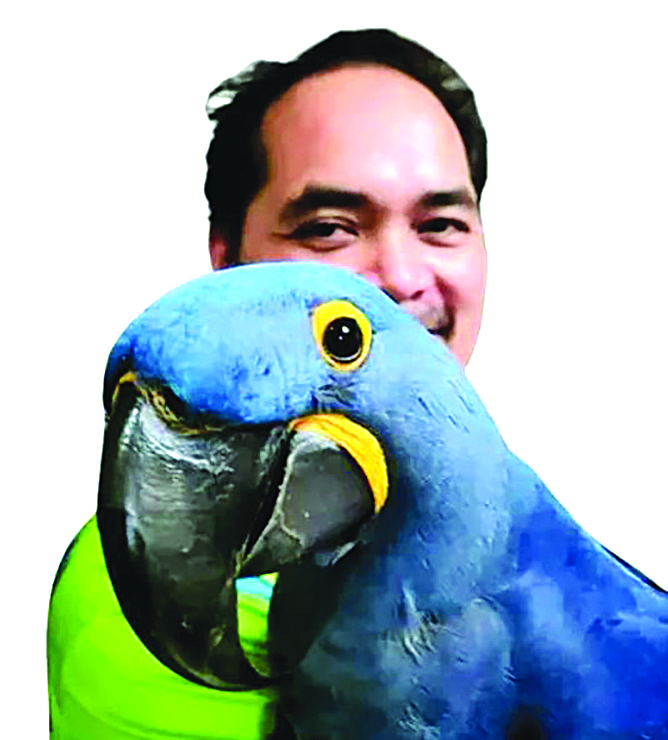
Florante says Bird keeping requires “passion and heart.”
“Taking care of birds is just like taking care of your own family,” he explains. And just like children, birds need to practice communication with their human companions if they need to find their way back to them during free flight.
With free flight, Florante says that his birds haven’t really been affected by the pandemic. They’re still able to fly around his house, bond with him, and even kiss him whenever they see him at home.
Still, even with birds experienced with free flight, human companions should check if there are any predators in the area, if the area smells of chemicals, and if the weather is suitable for flying.
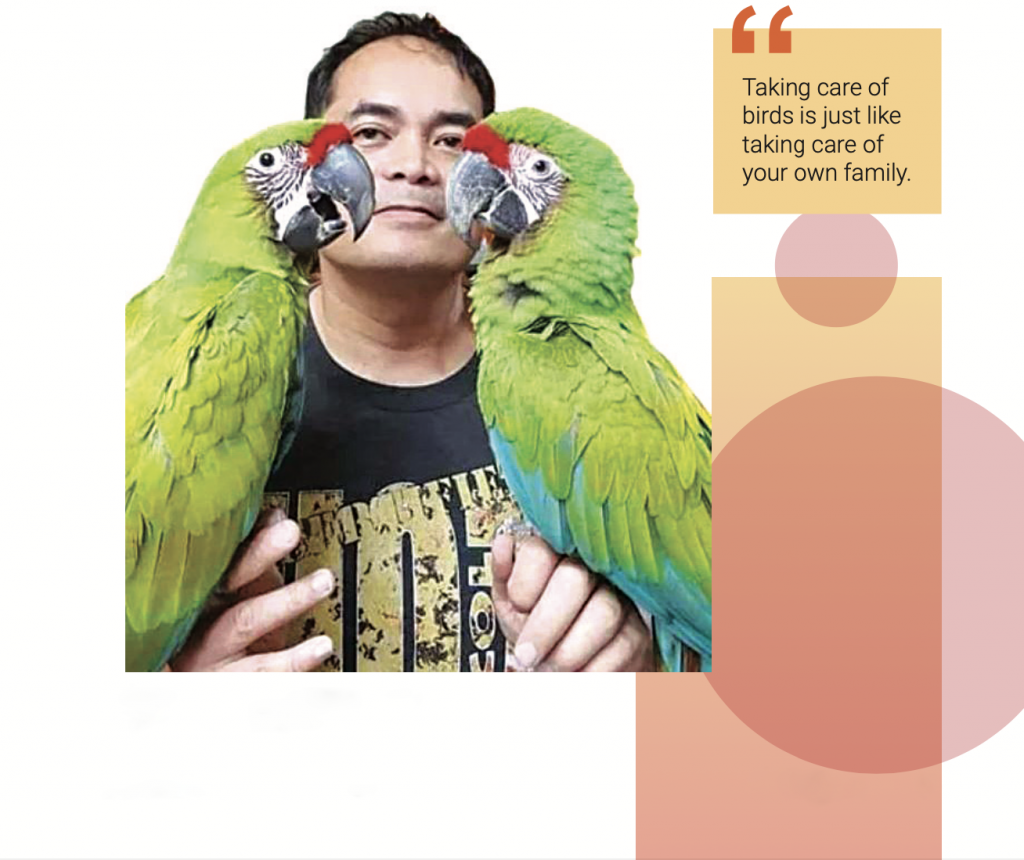
UFP is a free flight group that has over 21 chapters worldwide.
Florante also recommends setting up branches where birds can perch and play, as well as getting customized ring bands with the bird carer’s details in case the bird loses their way.
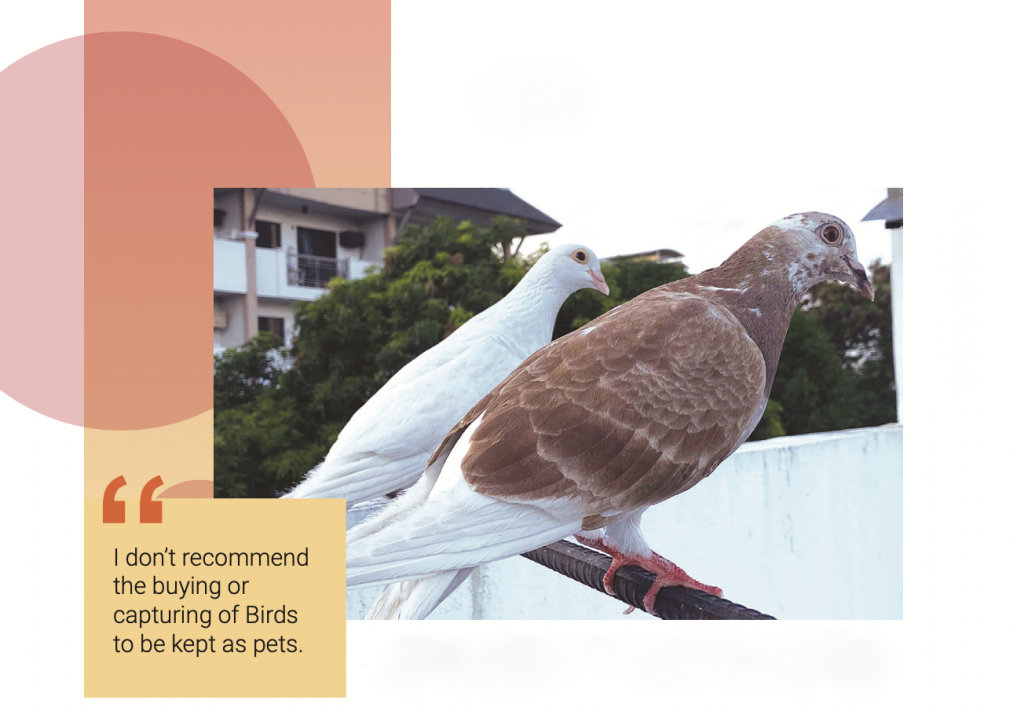
Ross Rawolle doesn’t keep his adopted Birds, Pili and Gata, in a cage because he knows they don’t need to be kept in a cage.
CAGE-FREE: MORE FREEDOM
While purchasing a nonhuman animal from a pet store is an easy choice, Poi says, “Adopting is highly recommended and a very good option if you can find one.”
Ross Rawolle, a bird photographer and animal rights activist, echoes Poi’s sentiments: “Hindi ko nirerekomenda na bumili o manghuli ng ibon para makapag-alaga (I don’t recommend the buying or capturing of birds to be kept as pets).”
Ross cares for two birds, Pili and Gata. He came across Pili when he went camping in Laguna. At the time, he says, “Medyo malakas ang ulan noong araw na yun at napansin ko na may ibon na basang basa at naglalakad mag isa (It was raining quite hard that day and I noticed there was a Bird that was drenched and walking on their own). He then realized the bird was but a baby. Ross kept the bird in his tent overnight, but the bird still wasn’t able to fly even under better weather the next day.
Ross explains, “[D]ahil siya naman ay Kalapati, isang domesticated na ibon, naisipan ko na iuwi na lang siya pabalik sa Maynila (Because the bird was a Pigeon, a domesticated bird, I thought about bringing them back to Manila).”
He later on adopted another bird, Gata, who now acts as Pili’s companion.
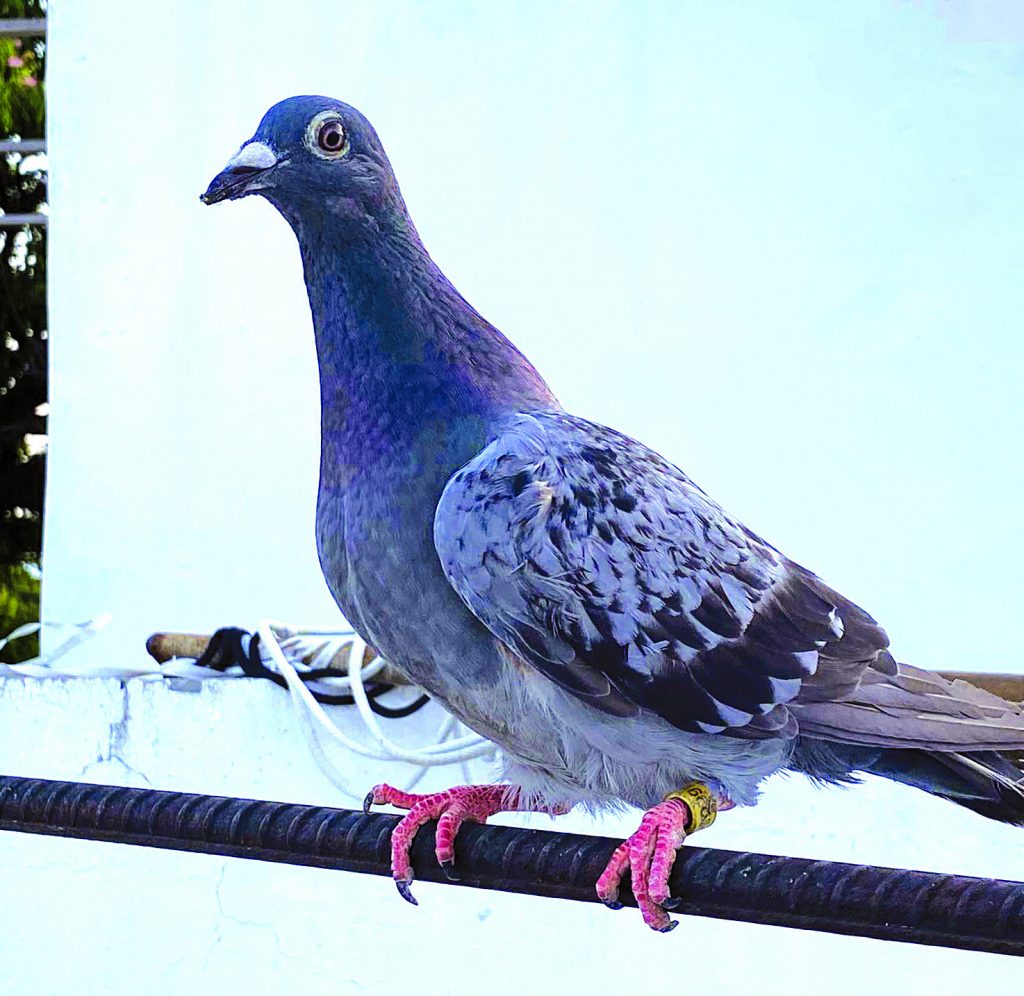
The relationship Ross has with his Birds offers the ultimate form of free flight.
ADOPTING AND LETTING THEM BE
Ross doesn’t keep the birds in a cage because he knows they don’t need to be kept in a cage. His relationship with Pili and Gata is the ultimate form of free flight: They are kept free, yet they come back again and again for food, attention, and affection.
“Kadalasan, ang mga ibon sa mga industriya ng pet shop ay nagsisiksikan sa maliit na hawla, nagkakahawaan ng sakit, at nagdurusa mentally dahil ginugugol na lang ang buong buhay nila na nakakulong hanggang sa magiging mga anak pa nila (Often, birds in the pet shop industry are crammed into small cages, infect each other with illnesses, and suffer mentally because they spend their entire lives caged until they have their own children),” Ross says.
As we look through pet shop windows and wonder at the beauty of the birds inside their cages, it’s important that we view them as animals deserving of love and a life well-lived.
In Ross’s words, “[W]alang sino man ang may gusto mabuhay araw-araw na iniisip kung papano sila tatakas (No one in this world wants to live day by day, thinking about how they might be able to escape).”
